EcoWater Systems, the manufacturer behind Costco water softeners, has an extensive product catalog which includes 7 traditional water softeners, 4 water refiners, and one hard water anti-scale system (also known as a salt-free water-softening system).
Here’s a list of Costco water softeners:
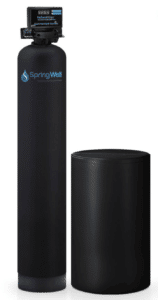
- Type: Ion Exchange
- Grain Capacity: 32,000 – 80,000 grains
- Flow Rate: 11 – 20 GPM
- Warranty: Lifetime
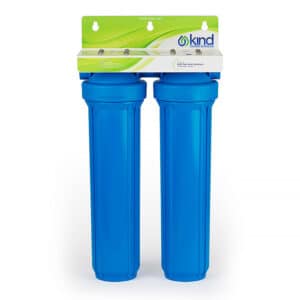
- Type: Template Assisted Crystallization
- Grain Capacity: N/A
- Flow Rate: 15 GPM
- Warranty: Lifetime
Who Manufactures Costco Water Softener Systems?
Costco water softeners are manufactured by EcoWater Systems.
A pioneering scientist named Lynn G. Lindsay Sr. founded EcoWater Systems in the 1920s. The company website claims the scientist held the patent for the invention of automatic water softeners. While that doesn’t seem true, Lynn G. Lindsay Sr. still holds a patent for inventing the water softener control mechanism and revolutionizing the industry.
The pioneering advances of the brand go beyond the control mechanism for water softeners. In the 1950s, EcoWater Systems automatized the regeneration process, which significantly lowers the maintenance requirements of water softeners to a great extent.
In addition, they found a way to place both the resin and brine tank of a water softener in the same container. Before that, a water softener had a mandatory two-tank setup. Thanks to EcoWater, these bulky devices became more space-friendly.
Last but not least, the company was among the first to employ electro-mechanical timers (in the 1970s) and wireless digital system heads (in the early 2000s) to keep track of the regeneration process.
Nowadays, EcoWater Systems is active in North America and Europe thanks to its many dealers, such as Costco.
EcoWater Water Softeners Comparison Chart
| Device/Features | Setup | Technology | Mobile app | Lead reduction | Salt detection |
|---|---|---|---|---|---|
| ECR3700 | Single tank | Salt-based ion exchange | Yes | No | Yes |
| ECR3702 | Double tank | Salt-based ion exchange | Yes | No | Yes |
| Compact Water Softener | Single tank | Salt-based ion exchange | Yes | No | Yes |
| ESD2750 | Single tank | Salt-based ion exchange | No | Yes | No |
| ESD2752 | Double tank | Salt-based ion exchange | No | Yes | No |
| ESS1152 | Double tank | Resin media of your preference | No | No | No |
| EEC 1502 | Double tank | Salt-based ion exchange | No | Yes | No |
| ERR3700 | Single tank | Salt-based ion exchange + coconut shell carbon block | Yes | No | Yes |
| ERR3702 | Double tank | Salt-based ion exchange + coconut shell carbon block | Yes | No | Yes |
| ERRC3702 | Double tank | Salt-based ion exchange + catalytic carbon | Yes | No | Yes |
| Compact Water Refiner | Single tank | Salt-based ion exchange + coconut shell carbon block | Yes | No | Yes |
| EcoProTechT | Single tank | PTT technology + coconut shell carbon block | Yes | No | Not applicable |

- Type: Ion Exchange
- Grain Capacity: 32,000 – 80,000 grains
- Flow Rate: 11 – 20 GPM
- Warranty: Lifetime

- Type: Template Assisted Crystallization
- Grain Capacity: N/A
- Flow Rate: 15 GPM
- Warranty: Lifetime
Costco Water Softener Reviews
ECR3700 Series
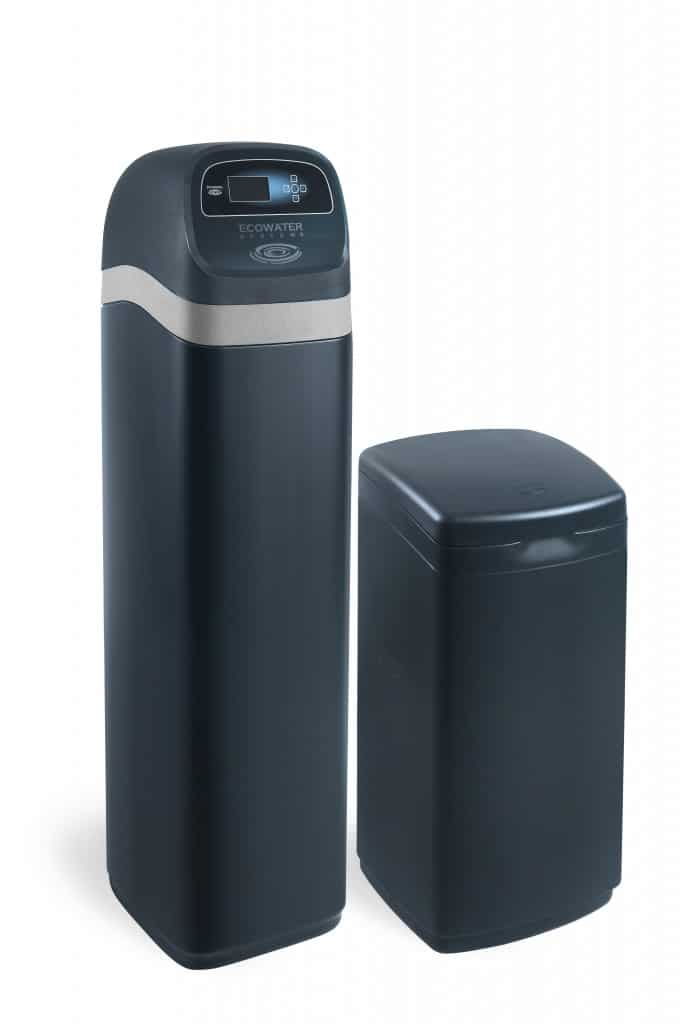
ECR3700 is the flagship product of EcoWater Systems, as it’s one of the most efficient items in the brand’s catalog. If you ask an EcoWater professional for advice, they’ll probably recommend this device, be it for tap or well water.
ECR3700 has all the features that make EcoWater a dependable brand. It has a patented wireless connection system, HydroLink Plus, that allows you to monitor how much water the system uses and softens, how much salt is left inside the brine tank, and how long until the next maintenance session. You can keep an eye on all these details via your smartphone using the brand’s app.
In addition, the system head has a water meter for tracking the chemical feed and flow switch.
Typically, water softeners decrease the flow rate of the water because the water needs to spend time inside the resin for the minerals to be eliminated. With a one-inch riser valve, EcoWater ensures the flow rate and water pressure in your household remain stable, no matter how many bathrooms you have. The device makes use of counter-current pressure during its self-cleaning backwash process. In other words, it doesn’t depend on the incoming water, so that it won’t affect the water flow in your house.
Traditional salt-based water softeners often require you to level the salt to perfection to prevent salt bridges. The ECR3700 model will make you forget about that, as the device entertains an integrated leveling sensor. The only thing you need to do is add salt to the brine tank.
Moreover, ECR3700 comes with a single-tank design, meaning it saves space and can fit inside a cabinet. A multi-wrap fiberglass layer covers the device’s tank, protecting it from damage, ruptures, and corrosion.
ECR3702 Series
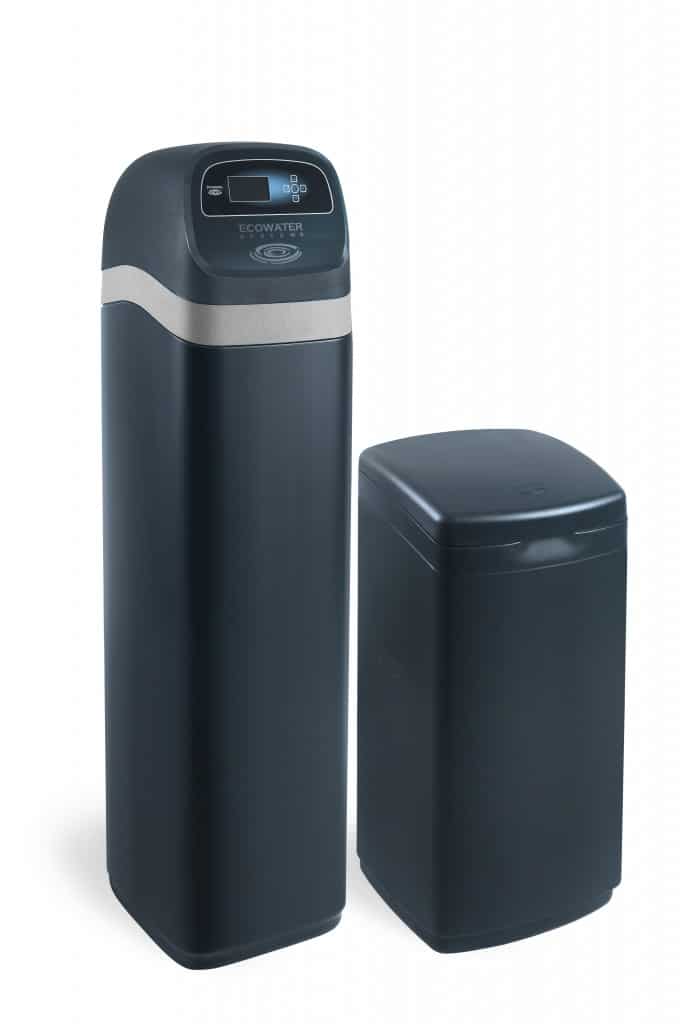
ECR3702 is the bigger sibling of ECR3700. It comes with a double-tank setup — one tank for the resin and one for the brine, making it more suitable for softening extremely hard water.
Of course, having a separate brine tank means ECR3702 is a bit more high-maintenance than ECR3700. However, to ease brine tank maintenance, EcoWater protects its brine tank with a dampened hinge salt cover that shelters the salt inside the tank from damping and forming salt bridges.
Like the previous model we reviewed, ECR3702 features the wireless connection system HydroLink Plus. That way, you can observe the device’s process through your mobile phone and take action if you notice an error or a system malfunction.
The device has a digital prediction module. This module records the current data regarding salt use during regeneration and water hardness and makes predictions to ease future operations.
In traditional water softeners, the resin typically loses its efficiency after several regenerations because the brine solution used in the regeneration processes can’t clean or recharge every part of the resin equally. EcoWater prolongs the resin’s effectiveness with high-precision self-cleaning distributors and washed quartz underbedding beneath the resin, ensuring the brine solution reaches all the resin beads.
Sometimes, traditional water softeners over-fill due to malfunctioning brine valves. ECR3702 has a positive-action brine valve resistant to corrosion and related errors.
Compact Series
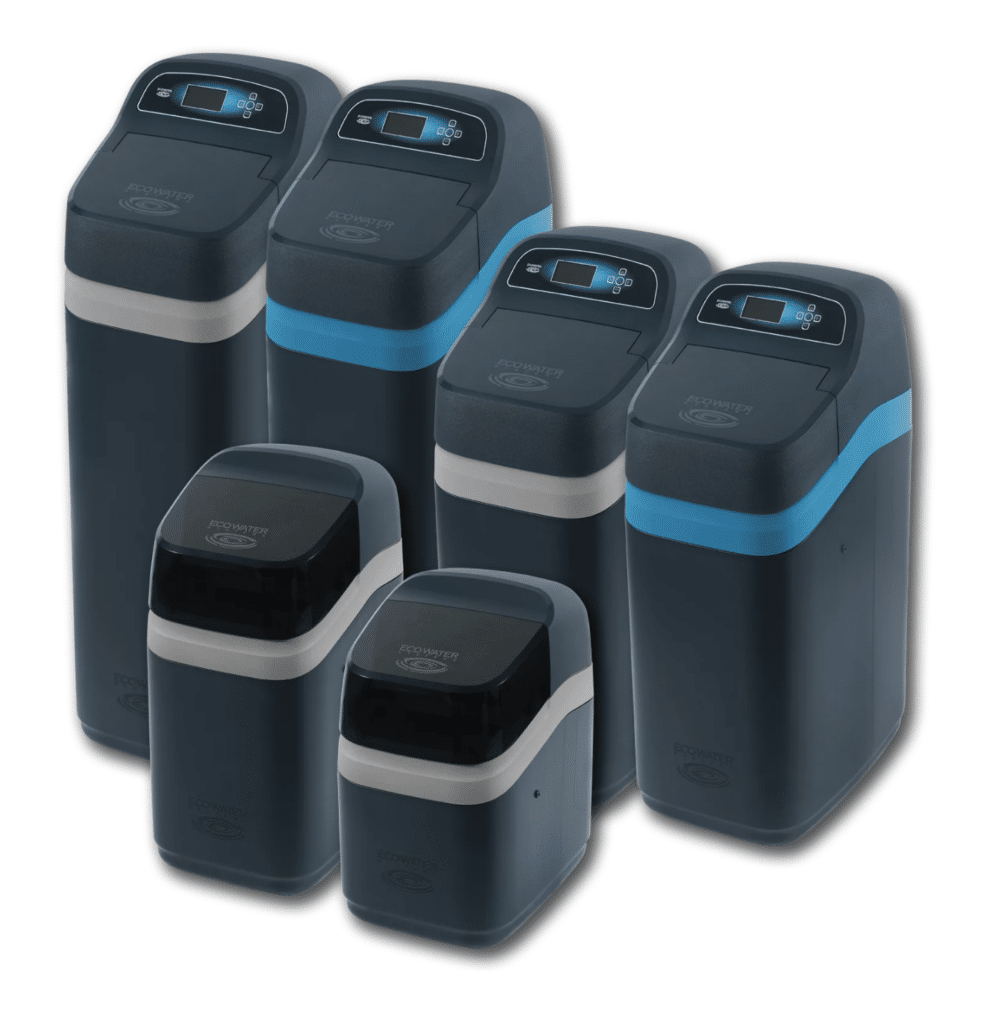
What you can expect from the EcoWater Systems Compact Series is pretty self-evident by the product name: compactness. The brand manufactures this series for people with little or no space in their homes. The final products are small and cabinet-friendly devices that can fit almost anywhere.
The Compact Series has three models: Model 100, Model 200, and Model 300. The first two models are extremely small and easily fit under sink spaces. The Model 300 is a bit bigger than the first two, but it’s still unlikely to create space problems under your sink or inside a cabinet.
Smaller devices have smaller brine and resin capacity. This means the Compact Series won’t be effective against extremely hard water, but you can soften moderately hard water with these units.
Models 100 and 200 have transparent salt covers, while Model 300 has a dampened hinge salt cover. This difference makes the first two unfit for operation in a moist environment, as the transparent salt cover doesn’t protect against dampness.
However, that’s not necessarily a problem. A smaller brine tank means you need to add salt more frequently, so the possibility of salt-dampening is considerably lower thanks to the salt-adding frequency.
Similar to the ECR models, the Compact Series doesn’t require you to level the salt to perfection since these units have built-in leveling sensors that do the job for you. The devices are compatible with the HydroLink Plus app, too, so you’ll be regularly notified about the salt levels inside the brine tank, the regeneration process, and the softening operation.
If you reside in Quebec, though, we should warn you that the EcoWater Systems haven’t yet made its Compact Series available in your city.
ESD2750 Series
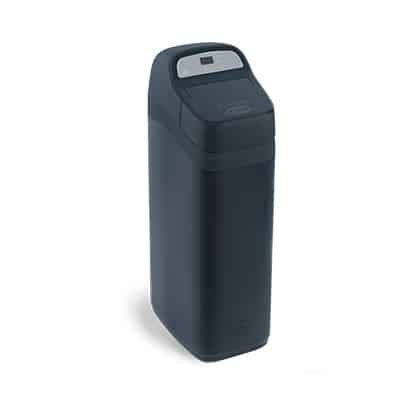
The ESD2750 Series is the more budget-friendly version of the ECR3700 Series. Unsurprisingly, it’s also less efficient and lacks some features that make ECR3700 the brand’s flagship item.
For instance, the ESD2750 isn’t compatible with the HydroLink Plus app. So, it’s impossible to monitor the device’s operations and know if there’s a malfunction or what the salt levels inside the brine tank are without checking the device itself.
Still, the unit comes with a user-friendly system head. You should probably check its function every two days to be able to catch errors in time.
The ESD2750 model does come with some state-of-the-art technologies. For instance, it records operational data, makes predictions for the future, regenerates through self-cleaning distributors, and has a positive-action brine valve designed to prevent an overflowing brine tank.
In addition to these standard EcoWater attributes, the ESD2750 model has a time-keeping option. If it’s turned on, the unit keeps softening water for six hours based on recorded data when there’s a power outage.
Most traditional water softeners limit your water flow during regeneration or require you to bypass the device manually. The ESD2750 Series automatically activates bypass during regeneration, allowing you to use hard water.
Besides hard water minerals, ESD2750 reduces barium, radium, and lead levels in water. An independent lab tested the device and certified it against the National Sanitation Foundation (NSF) standards of NSF/ANSI 44, NSF/ANSI 226/228, and NSF/ANSI 372.
If you aren’t impressed yet, let us tell you it’s rare for a water-softening device to have these certifications.
ESD2752 Series
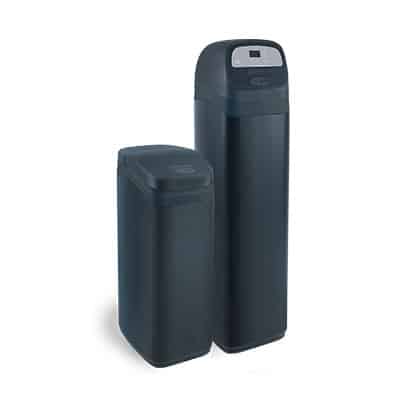
ESD2752 is the alternative to ESD2750 in the same way that ESD3702 is another version of ESD3700 — it’s just a double-tank design, sharing more or less the same features.
If you have enough space in your household, the ESD2752 Series is a better choice because single-tank designs are more prone to salt bridges. But, as all operations take place in the same tank, there will be more moisture in the unit.
A double-tank setup means the brine tank is separate from the resin tank. Thanks to this, the ESD2752 Series has a more sophisticated brine valve that controls the water flow and shuts it off automatically when the brine tank overflows.
The ESD2752 Series also records data based on recent usage patterns to predict future operations. In the case of a power outage, it keeps working for six hours using this data.
Similar to its single-tank sibling, it’s NSF-certified for reducing barium, radium, and lead.
ESS1152 Series
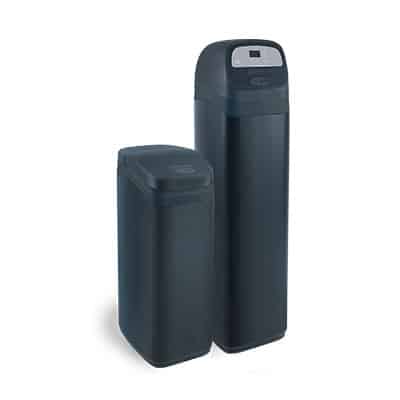
The ESS1152 isn’t a water-softening device per se because it lacks the prerequisite material, namely the resin that attracts and traps the hard water minerals.
Still, the brand markets this product as a water-softening item, which isn’t far from the truth.
Here’s what we mean.
With the ESS1152, EcoWater is trying something different. The brand provides a resin tank, a brine tank, all the necessary valves, and a system head. However, you can pick whatever resin (or any other softening media) you prefer.
You’re in the position to pick the softening media with exactly the right grain size to provide soft water for you and your family. But that’s not necessarily a plus. If you undersize the media, you’ll risk mineral buildup in the machine and decreased water pressure in your house. So, it’s imperative to get the proper water softener grain size with this particular system.
Also, considering that the ESS1152 only has a 6/8” control valve (which is humbler than the 1” option available with the ECR3700 and ECR3702), the possibility of low water pressure is a dire reality with the ESS152 series.
However, the ESS1152 Series has some useful features. For instance, it has an electronic timer with a menu that allows you to control, reconfigure, and monitor the regeneration process.
Like the best EcoWater water softeners, the unit sports a fiberglass cover over its tanks and self-cleaning redistributors that ensure the regeneration and backwash processes are equally effective everywhere in the softening media.
Lastly, the unit’s power supply is energy-efficient. Electrical hazards during installation and maintenance are lowered, making this unit a friend to your power bill.
EEC 1502 Series
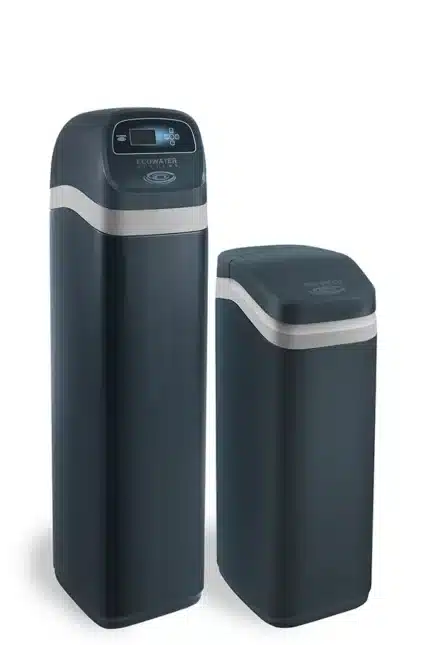
The EEC 1502 Series is the most budget-friendly item in the EcoWater catalog. So, it’d be unfair to expect it to perform to the highest standards, especially when dealing with extremely hard water. But, it might be the most reasonable pick for mild hard water.
The device has quite a bit of tech for an economy product. It comes with:
- Prediction module — records past data and predicts future softening, regeneration, and backwash patterns.
- Time-keeping feature — allows the device to operate for six hours even when the power is out, or it’s not connected to any power supply.
- Fiberglass cover — protects its tanks from external damage.
- Self-cleaning distributors — ensure smooth and even regeneration and backwash cycles.
- Automatic bypass option — allows you to have water in your household during regeneration and backwash.
- NSF certification — guaranteeing lead reduction.
- Conditioner shroud kit — protects the unit from rain and harsh weather conditions if placed outside.
EcoWater Systems Water Refiner Series
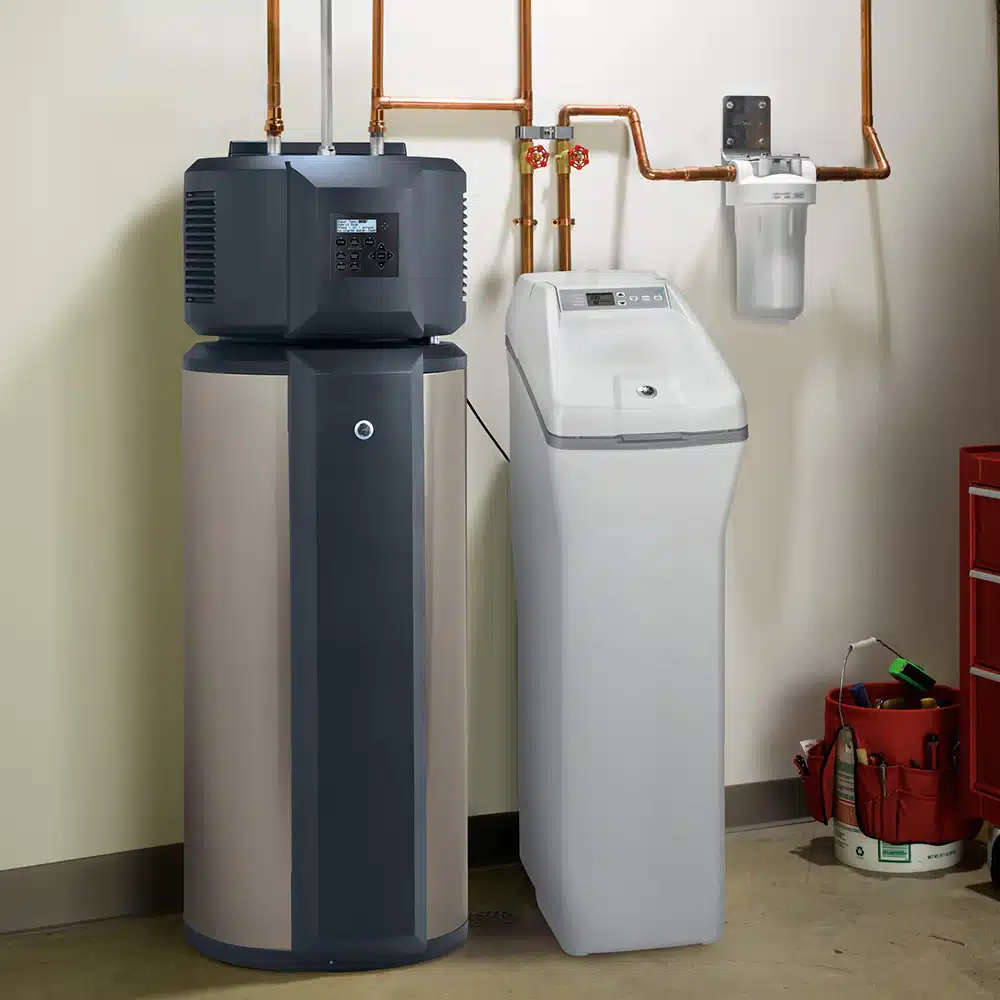
The water refiner series are water softeners with the capacity to remove aesthetic nuisance caused by water disinfectants typically employed by municipal authorities.
Municipal authorities disinfect water with chlorine and chloramines to prevent bacterial growth inside the municipal water distribution lines. Although these chemicals don’t adversely affect human health in the amounts added by municipal authorities, they change the color, odor, and taste of water.
Often, the disinfected water has a cloudy color, sulfur-like smell, and a chemical taste, all of which are off-putting in drinking water.
To resolve these issues, EcoWater combined its water softeners with an activated carbon coconut shell. As activated carbon blocks are one of the most effective chlorine removal methods, these devices eliminate aesthetic nuisances from your water and soften it at the same time.
In addition, chlorine degrades the softening resin, decreasing the life expectancy of the softening device. The EcoWater water refiners prolong the lifespan of the whole unit, especially if it’s connected to municipal lines.
Now, let’s look at the four different water refiners the brand offers:
- ERR3700 Series: ERR3700 is the water refiner equivalent of ECR3700. It’s a single-tank refiner that features the HydroLink Plus app, prediction module, dampened hinge salt cover, fiberglass layer over the tank, self-cleaning distributors, automatic salt leveling, and a coconut shell carbon block that comes with a lifetime warranty.
- ERR3702 Series: ERR3702 is the water refiner equivalent of ECR3702. Its only difference from the ERR3700 Series is its double-tank setup.
- ERRC3702 Series: ERRC3702 is the most robust EcoWater product. It has all the features of the ERR3700 Series except for the coconut shell carbon block. Instead, the ERRC3702 Series employs catalytic carbon, an upgraded version of activated carbon charged with electricity. This feature enables it to reduce a wider range of impurities, including heavy metals, chemicals, and microplastics. Additionally, its resin bed is stratified with resin beads of different sizes. Thanks to that, it’s more efficient than standard water softeners and capable of removing iron.
- Compact Series Water Refining System: The EcoWater Compact Series Water Refining System is the same as the Compact Series water softener, only with the addition of a coconut shell carbon block.
EcoProTechT Series
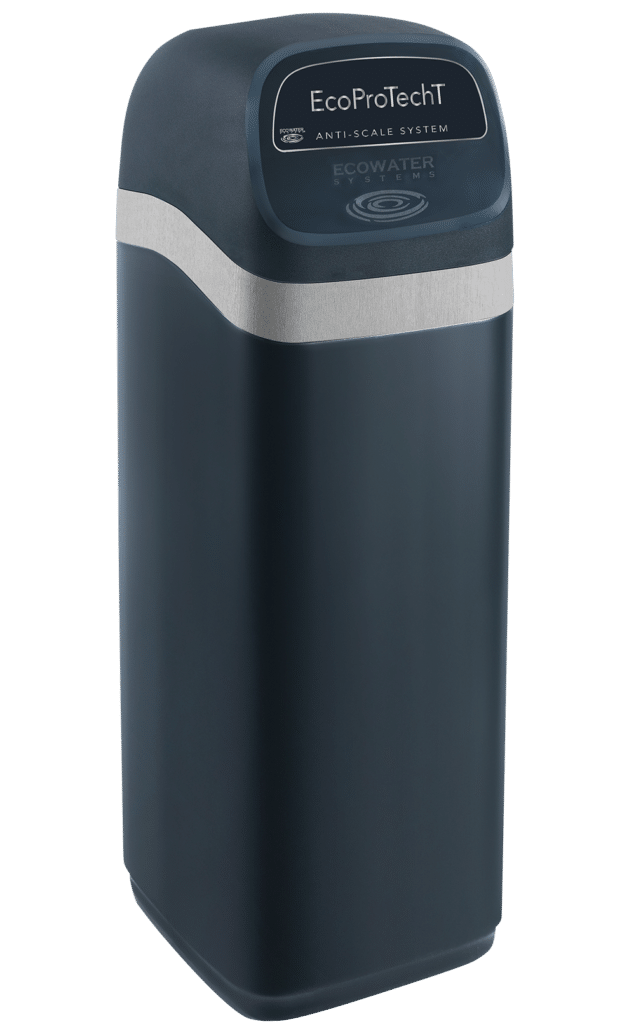
The EcoProTechT Series is the only EcoWater product that uses salt-free water descaling technologies to neutralize hard water. This particular device employs the brand’s patented PTT technology.
Although the brand doesn’t provide much information regarding this tech’s specifics, it works very similarly to the Template Assisted Crystallization (TAC) technique of other salt-free water conditioners.
In this method, the electrically charged media inside the device’s tank crystallizes hard water molecules. As these molecules can’t stick to any surfaces in their crystal form, they don’t build up in pipes and appliances or cause stains on dishes, laundry, or surfaces.
Additionally, these devices are more eco-friendly than conventional salt-based units since they don’t require salt to operate, and they don’t release salt into the environment. The same feature also makes salt-free devices low maintenance.
No salt means no regeneration, and no regeneration means a salt-free device won’t need electricity to work. That’s the case with the EcoWater EcoProTechT Series, too.
Like the water refiners reviewed above, the EcoProTechT Series has a coconut shell carbon block. This filter removes chlorine and chloramines from water.
The EcoWater saltless descaling system has an up-flow design, unlike the traditional water softeners with down-flow designs. Devices with an up-flow design allow more contact time between the water and the softening media, which makes them more effective.
However, a 2014 study showed that crystallization-based devices reduce hard water scale only up to 90%, while that number is 99% for traditional salt-based water softeners. So, we don’t recommend the EcoProTechT Series for those living in areas with especially hard water.
Costco Water Softener Prices
Costco water softeners costs between $500 – $5000. The exact price of each EcoWater model/series/unit can only be obtained by scheduling a free water consultation meeting with the company.
Additionally, if you opt for professional installation (which we recommend for all Costco water solution products), the corporation will charge extra. The installation costs vary between $500 and $1,000 depending on the product and your plumbing system.
Costco Water Softener Systems Reviews: User Feedback
The actual quality of the water softening systems Costco sells is rarely brought into question. Instead, customers highlight how the corporation’s customer service tries to sell the most expensive unit, always claiming the water hardness in the customer’s area warrants it.
Reviews also point out the high prices of Costco water softeners. An effective water softener that’s the proper fit for houses with seven bathrooms costs $1,000 to $3,000.
Often, manufacturers offer free installation. With Costco, that’s not the case. As if the high prices of the devices themselves aren’t enough, the company also charges extra for installation, bringing the total cost up to $6,000.
That aside, customers are happy with the performance of EcoWater softeners. They report that the devices operate just like the manufacturer advertises.
However, that doesn’t change the fact that you can do better with the money you pay for a Costco Water Softener.
Costco Water Softener Alternatives
- The SpringWell SS1 Water Softener is ideal for houses with one to three bathrooms thanks to its 11 gallons per minute (GPM) flow rate, 32,000-grain capacity, sturdy build, and lifetime warranty. The device is manufactured by the most trusted water treatment brand in the United States, costing only $1,500 (as of early July 2023). If you have a bigger household, the brand also has SS4 (4-6 bathrooms with 13 GPM flow rate) and SS+ (7+ bathrooms with 20 GPM flow rate) models. Of course, you need to pay a bit more for these models.
- Not only is The Aquasana Salt-Free Water Conditioner an excellent salt-free alternative to Costco softeners, but it’s also an amazing alternative to all traditional salt-based water softening devices. It operates with a TAC-based system, requiring no electricity, salt, or maintenance. It has a staggering 42,000-grain capacity and a 7 GPM flow rate, ideal for houses with up to three bathrooms. It costs only $800, which makes it the most budget-friendly alternative to the extremely expensive Costco softeners.
Conclusion
Many of the Costco water softener systems feature state-of-the-art technologies such as the HydroLink Plus app, prediction modules, salt leveling sensors, stratified resin structure, automatic bypass options, and lead reduction capacities.
Additionally, the brand has effective water refiners that removes chlorine, chloramines, and hard water minerals. These systems employ either coconut shell carbon blocks or catalytic carbon media.
Lastly, EcoWater Systems has an excellent salt-free system in its catalog. With this system, you can eliminate hard water scales without harming the environment by releasing salt into it.
However, the customer experience suggests that the Costco water softener systems are dramatically overpriced. We recommend you stick to alternatives such as the SpringWell and Aquasana water softening systems.